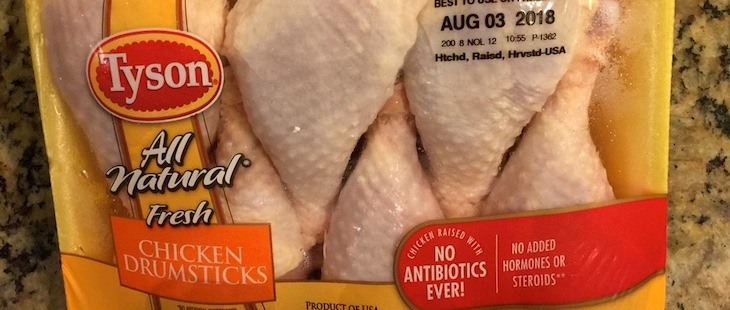Tyson blames tariffs, excess meat supply for lower earnings guidance
by July 30, 2018 7:10 pm 874 views

Tyson Foods was flying high on hopes for a record year of earnings with low grain costs and growing market share among its largest brands. But escalating trade tensions and tariffs on beef and pork have resulted in an excess supply of meat and falling prices.
On Monday (July 30), the Springdale-based meat giant lowered its full-year earnings guidance by 85 cents on the low-end and 70 cents on the high-end. The downward guidance comes one week before the company reports its third quarter earnings results on Aug. 6.
The company expects fiscal 2018 earnings of $5.70-$6 per share, down from the $6.55-$6.70 previous guidance last given in May. The company did not give guidance for the third quarter, but said the fourth fiscal quarter, which began July 1, is off to a sluggish start.
“The fundamentals of our business are solid, and global demand for protein in all forms remains strong,” said Tom Hayes, Tyson Foods president and CEO. “Our beef and prepared foods businesses are performing very well, and I believe the diversity of our portfolio of proteins and brands has given us some level of insulation from challenging market conditions. Our forecasted earnings range reflects the current market volatility in meat prices.”
Hayes said the combination of global trade policies and the uncertainty of any resolution on tariffs and some trade agreements have created a challenging market environment of increased volatility, lower prices and oversupply of meat.
“Through pricing and aggressive cost management, we’re working to stabilize the impact of freight and feed ingredient costs; however, we still face pressure on chicken sales volume and pricing due to the abundance of relatively low-priced beef and pork on the market. We are working to mitigate these pressures, but our fourth quarter is off to a slower than expected start driven primarily by market related factors,” he said.
Tyson Foods expects the imbalance between supply and demand to equalize in the coming months, but in the short term is trying to manage through the challenges.
Shares of Tyson Foods (NYSE: TSN) sold off sharply Monday, closing at $58.72, down $4.84. Shares lost more than 7% of their value on volume, three times the normal range. Shares are down 27% year-to-date with the company’s market cap falling $8 billion since January.
Analysts were expecting Tyson Foods to earn $6.53 per share for the fiscal 2018, and that is now under review by several brokerage firms after the lower guidance from Tyson Foods. Jefferies Analyst Akshay Jagdale recently lowered his profit guidance estimates for Tyson and its competitors citing demand for chicken has weakened in the past few weeks as consumers are eating more pork and beef priced at discounts.
“Commodity chicken prices will remain weak through at least Q1 of 2019,” Jagdale noted.
Tim Ramey of Pivotal Research Group lowered his price target for the shares to $40 from $55 saying, “We won’t really know for several quarters the full magnitude of the impacts of the Chinese tariffs, if any, but the direction of the impact is clear – higher risk to the sanguine earnings outlook.”
THIRD QUARTER PREVIEW
Analysts expect Tyson Foods to earn $1.58 per share in the third fiscal quarter for total net income of roughly $581 million, up from $447 million, or $1.28 earned in the year-ago period.
Tyson Foods’ beef segment and prepared foods segment are expected to be the top performers in the third quarter. Total revenue is expected to top $9.85 billion, up 5% year-over-year. Overall, the third quarter is expected to show solid results, according to analysts.
Beef packer margins have been strong this year. John Nalivka, president of Sterling Marketing, expects packer margins to average about $147 per head in 2018, up from $120 in 2017. While Nalivka said there has been a slight dip in profits in recent weeks, packers are still profitable.
Pork profits are much harder to come by. He said hog farmers are losing money per head. Packers like Tyson Foods are expected to earn an average of $13 per head, down from $25 profit per head last year. Bernstein analyst Alexia Howard said pork margins even briefly dipped into negative territory after the Mexican tariffs were announced. Howard said while beef margins are still fat, there are some lean times coming for the pork packers until Trump and China settle their differences.
Tyson Foods officials admit pork margins have been compressed because of the oversupply of meat which is no longer being exported. The company also said its chicken segment is sluggish because of having to discount product to compete with lower priced pork. The U.S. Department of Agriculture reports wholesale chicken breast prices are the cheapest for this time of year since 2010 and pork is at a seasonal nine-year low.
This pricing pressure hits at the same time freight and personnel costs are up from a year ago. Hayes said the company expects higher freight costs to be somewhere around $250 million for the year. In the second quarter that equated to 14-cents per share in earnings. Hayes had hoped to pass some of the the costs to consumers in the back half of the year, but now the company is having to discount its prices because of excess supplies. This will likely mean the freight costs are a bigger ding to earnings in the third and fourth quarters.
Tyson Foods also said its benefit from tax reform is not quite as large as previously reported. The company now expects tax reform to benefit earnings by about 70 cents a share, not 85 cents are previously reported.
